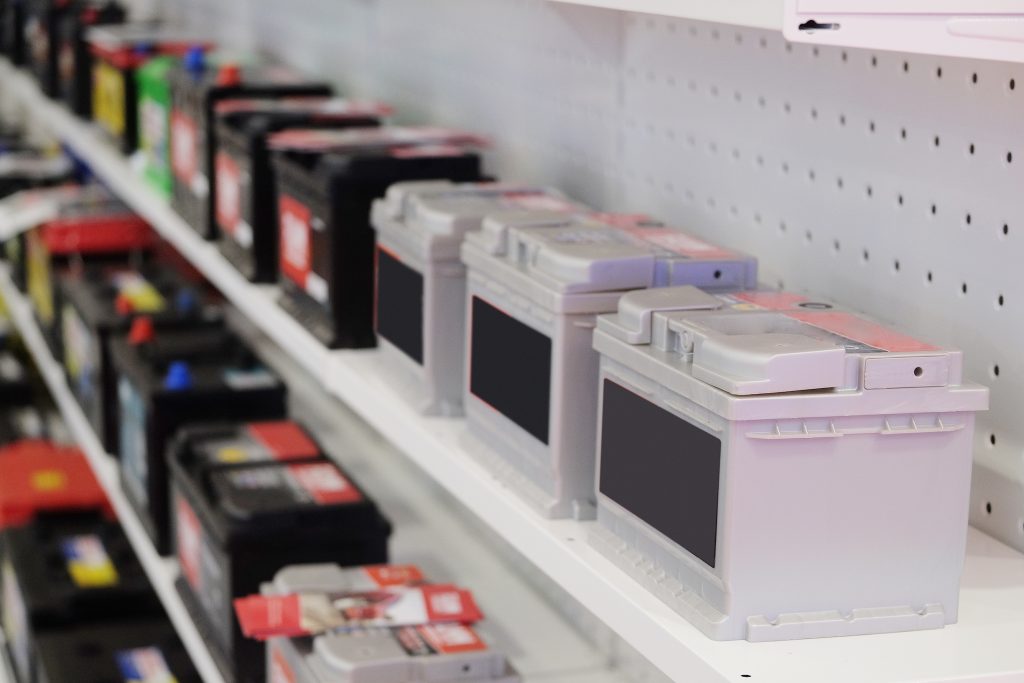A place for everything, and everything in its place.
A Totally-Not-Boring Blog About Storage
How to Properly Store Batteries in Long Term Self Storage
Table of Contents
- Remove batteries from equipment before placing them in storage
- Keep batteries away from metal objects
- Control for temperature and humidity
- Don’t freeze or refrigerate batteries
- How to store rechargeable batteries
- How to store vehicle and car batteries
- Basic battery care tips
- How long do batteries last?
- How do you properly dispose of batteries?
- Storing batteries at Storwell Self Storage
Since Italian physicist Alessandro Volta developed the first operable battery in 1800, batteries have been an essential element of our everyday lives powering everything from flashlights, to defibrillators, to video game consoles. Batteries are an ever-present part of modern life but they can also be quite dangerous if not treated properly. This is especially true when talking about the proper storage and disposal of batteries. If you live in the GTA and are looking to store your batteries in a self-storage unit in Scarborough, Etobicoke, or Mississauga at a Storwell location, there are a few things you have to know to make sure your batteries are stored safely and will not cause harm to you or your unit,
Batteries can be hazardous to our health when they are not stored and cared for correctly. Long term battery storage requires specific considerations to ensure that the battery won’t leak, explode, or ruin other batteries. There are also things you can do to prolong the life of commonly used batteries. In this guide we will outline how to how to store batteries as well as how to care for batteries while in use. We’ll also explain how to dispose of batteries safely, the best places to put them, and some other factors that might be unfamiliar to you.

Remove batteries from equipment before placing them in storage

Any battery-operated item you’re placing in self-storage likely won’t be used for a prolonged period of time. Your batteries stand a better chance of lasting longer if you take them out of their devices or their charger and store them separately. It will also prevent damage to your devices in the event that the batteries leak or corrode. Many people make the mistake of leaving integrated batteries in devices (such as laptops) while in storage. But even a device that is switched off, it will use its battery’s electricity and the battery will eventually die. So, take all such batteries out and store them separately. If a laptop is stored for years you should also take out the small battery that keeps the BIOS going as this too will eventually expire and may corrode inside the device.
Keep batteries in their original packaging
If possible, don’t open a new package of batteries until you need to start using them. Keeping the batteries in their original packaging has more than one advantage. In their original packaging, your new batteries will be protected from environmental factors, such as humidity, which can affect the power of the battery. If loose batteries contact each other, or if the terminals come into contact with other metal objects, this could cause short-circuit. When you just keep them in their packaging, this kind of accident isn’t possible. Additionally, used or partly used and new batteries should always be kept separate. If your appliance needs more than one battery, it’s best the batteries have the same age. Store your used and new batteries in separate containers or plastic bags and mention the date you bought them. Also, batteries of different types should be kept apart from one another. If they are stored together, they could react and cause short-circuits.
Keep batteries away from metal objects
Batteries and metal objects don’t mesh well. If batteries come into contact with metal, they could short-circuit. The container in which you store your batteries should be made of plastic, glass, wood or any other material other than metal. Also, do not store other metal objects in the same container as your batteries. This not only applies to coin batteries, which are more sensitive to short-circuit, but to all kinds of batteries.
Control for temperature and humidity
The ideal temperature for storing most batteries is 15° Celsius, but if you store them at a slightly higher temperature, it will not cause any significant damage. However, you should always keep your batteries out of direct sunlight. If you store batteries in a spot that is too hot, it will cause the self-discharge of the battery to rise. The capacity will drop faster and your battery will not work as long as when it would have been stored in colder temperatures. Low temperatures tend to have a positive impact on the lifespan of batteries, but too low temperatures can go hand in hand with high humidity, which will influence the lifespan of your battery in a negative way. Condensation, corrosion and leakage can be caused by high humidity and should be avoided at all times.
Don’t freeze or refrigerate batteries
Contrary to common belief, you should not store batteries in the freezer. The condensation can cause the batteries to corrode and permanently ruin them. Extreme cold also causes the electrons in the batteries to slow down, preventing them from getting excited and doing their job. If you live somewhere very warm, then it might be feasible to refrigerate batteries. However, it’s then important that you keep them in an anti-condensation container and let them acclimatize at room temperature for at least 24 hours before use.
How to store rechargeable batteries

Rechargeable lithium-ion batteries are used in dozens of devices from cell phones to power tools. To keep these batteries in good condition, store them at 40% capacity. Avoid depleting the battery entirely before storage. Store batteries in Ziploc bags or waterproof containers to prevent corrosion, and include a desiccant such as silicon packet to avoid moisture. Do not store lithium batteries in the refrigerator. On a side note, you should remove a fully charged battery from a charger as soon as possible. Do not leave your cell phones, laptops, or other devices plugged in indefinitely as this can shorten the lifespan of the battery.
How to store vehicle and car batteries
The best way to preserve a car battery is to use it periodically. When storing a car temporarily, take the car for a spin every few weeks to charge the battery. If you’re storing a car you can’t drive for more than a couple months, consider removing the battery completely. Once you remove the car battery, clean it thoroughly to remove any corrosion then store the car battery in a dry location that is cool but will not reach freezing temperatures. Consider hooking up the car battery to a trickle charger to preserve the life of the battery while it’s in storage. Make sure to carefully read your vehicle’s manual for more specific battery storage instructions.
Basic battery care tips
It’s important to care for batteries when they aren’t in storage. Batteries that are currently in use are subject to improper handling and can leak, become corroded or otherwise become defective if not properly taken care of. Keep these things in mind when using batteries:
- Keep batteries away from children. Coin-shaped lithium batteries are especially hazardous because they are a choking hazard.
- Keep all batteries away from warm or hot temperatures. The heat can cause the battery to explode, leak, or become damaged.
- Dispose of used batteries immediately after they stop working. Keeping depleted batteries inside a device can lead to unwanted damage.
- Remove batteries from any device that you are putting into storage and won’t be using for an extended period of time.
- Remove all batteries once a device stops working. Avoid mixing and matching batteries with different manufacture dates inside a device.
- Never try to recharge a battery unless it is labeled ‘rechargeable.’ Also, only recharge batteries on their designated chargers.
How long do batteries last?

The longevity of new batteries varies depending on the manufacturer, when they were made, and their contents. The lifespan of household batteries in their original packaging can range from 5 to 20 years in storage. On average, a car battery will last about four years under normal conditions. Some car batteries may last several years beyond that. Most unused alkaline batteries will last between five and 10 years, while Ni-MH batteries have a shelf life of three to five years of non-use. Lithium-ion batteries, which power devices like cell phones, have a low self-discharge rate and could keep a partial charge for up to four years before being depleted. If your battery has an expiration date, the manufacturer typically guarantees that the battery will hold on to its full charge until that time. Most expiration dates are conservative so most likely your expired batteries will still have a charge for some time after, if they are stored in the correct conditions.
How do you properly dispose of batteries?
In Toronto, used batteries are considered Household Hazardous Waste (HHW) and must not be placed in your garbage bin, blue bin, or green Bin. Instead you should place batteries in a clear plastic bag or seal terminals with nonconductive tape and take them to one of the city’s drop-off depots or community environment days. If a battery explodes, do not touch the battery or acid with bare hands. Instead, put on a pair of latex gloves and carefully remove the battery from the device. Make sure not to touch any skin in the process.
Non-rechargeable batteries, which have only a single use, should be removed from devices once they have used up their charge. If you leave them in the device, even if they no longer have a charge, they can corrode or suffer discharge. This can quickly damage your devices. Over time, even rechargeable batteries may no longer hold their charge as well as they did in the beginning. Once your batteries reach this point, recycle them. Your local cell phone store may offer a trade-in option for your phone battery.
For AA batteries, AAA batteries, and other standard size batteries, you may want to wait until local hazardous materials recycling dates or check with local home improvement stores. Home Depot, for example, offers a battery recycling program that will put your old batteries to good use.
Storing batteries at Storwell Self Storage
The most important thing to consider when storing batteries inside of your self-storage unit is to remove them from their electronic devices and keep them in a separate non-metal container. Storwell has power ventilated units that control for humidity, which ensures that batteries are kept in the ideal conditions so that they don’t prematurely lose their charge. Storwell Self Storage is a great option for battery storage; our facilities have state-of-the-art security features to ensure that our customers’ items are properly taken care of. Some of the security features include 24-hour video camera surveillance, pass code gate access, and individually alarmed units.



